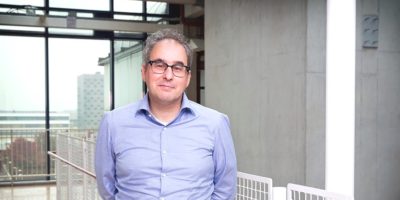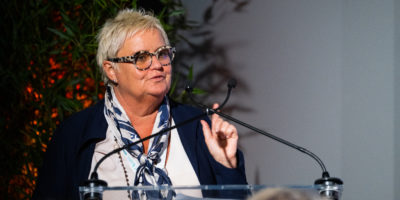Microbiologist vs. Microbiologist – Looking back
For the COMBACTE Magazine of 2018 (p. 40)we interviewed two microbiologists working for COMBACTE projects. We had the honor to speak with Alexey Ruzin and Olivier Barraud. They both answered questions providing us a look in their daily (working) life. Now more than 2 years later, after much progress in studies and within COMBACTE, we interviewed both microbiologists again to look back on their work of the last period.
Alexey Ruzin, Principal Scientist for AstraZeneca and COMBACTE coordinator and EFPIA co-lead
Although SAATELLITE and EVADE clinical studies and pre-specified data analyses have been completed, some of the sample testing and biomarker studies as well as additional post-hoc data analyses are ongoing. It is also a busy time for publishing the study results: while SAATELLITE and EVADE teams are busy working on the manuscripts describing the top line study results, the follow-up publications focused on the more specific aspects including performance of the rapid PCR tests used for the patient screening, analyses of the bacterial strains, immunological profiling, PK/PD analyses etc. are at various stages of planning and/or preparation. The ASPIRE teams are in a similar situation. Considering all of the above together with my increased responsibilities of being a coordinator and EFPIA co-lead, it explains the increased workload and intense daily activities for myself and for COMBACTE colleagues. What helps us a lot is the motivation and commitment to the success of the COMBACTE consortium which we are all part of, as well as a tremendous sense of the team work and the spirit of true collaboration.

Olivier Barraud, Hospital Practitioner at Limoges University Hospital Center
On my site, at CHU Limoges, we were involved in several COMBACTE studies: ANTICIPATE, ASPIRE-SSI, EVADE, EXPECT, REJUVENATE, SAATELLITE. Activity in the microbiology laboratory was intense in order to manage all these trials for which several hundreds of patients have been enrolled. Fortunately, my team was highly motivated with people dedicated to clinical research, and I think we succeeded quite well. Today, inclusions are closed for nearly all studies. Other new projects outside Combacte are ongoing now but activity has decreased, except for trials dealing with COVID.
My site being deeply involved in SAATELLITE, CHUL being the academic lead, I had the opportunity to participate in first line to the valorisation of the work done. I was associated in several posters, I presented the microbiological results at the French RICAI congress last year, I actively particpated in the redaction of a manuscript dedicated to qPCR results and microbiology. But SAATELLITE is not totally over: indeed, we started in September 2020, in collaboration with LAB-NET and Astra-Zeneca, an ancillary task for the exploration of the microbiome of endotracheal aspirates. This task is very challenging and I am very proud of my team that had to deal with more than 250 samples to manage in less than 3 months.
To sum up, work is now different but remains very exciting.

Did you experience progress and change in the collaboration between EFPIA and academics since the start-up of studies and now they are (almost) finished?
Alexey
I think we came a long way and made a lot of progress during these few years of collaboration. I did notice more understanding of each other’s skills and priorities, and increased coherence in the decision making and execution. All of the collaborative teams pass through several stages such as forming, storming, norming and performing. We all learned a lot from each other and, in my opinion, we reached the performing stage making this collaboration more productive and gratifying
Olivier
Yes definitely. We know each other better, we discuss more directly and we trust each other. Our goal is the same: doing the best job to make the project succesfull, but the ways to reach it can be different. I think academics have a better understanding where and how industrials want to go and I think this is true also for industrials. This public-private experience is much more enriching than a collaboration between several academic. I am convinced that working with industrials tend us to be more professional. This work with industrials is enriching and constitutes a great opportunity for the academic I am.
Is there a success you would like to share that happened during your work within COMBACTE?
Alexey
I consider the completion of the Phase 2 studies of MEDI4893 (SAATELLITE) and MEDI3902 (EVADE) monoclonal antibodies a success as these are the novel approaches for pre-emption of either S. aureus or P. aeruginosa pneumonia in the mechanically-ventilated ICU patients, especially in the era of the growing antibiotic resistance worldwide. We learned a lot from these studies by showing that rapid PCR tests were effective in identifying the patients at risk and narrowing down the subsets of patients that could benefit the most from these antibodies. Another example is the successful completion of a large ASPIRE-ICU study, where the study team identified and recently published on S. aureus colonization being a factor independently associated with S. aureus ICU pneumonia, thus informing the development of future therapies against this disease. It all happened during the 5 years that I have been with COMBACTE and I am extremely honored of being able to participate in this collaborative effort.
Olivier
SAATELLITE was our biggest trial in the laboratory and we spent a lot of time and energy on it. I am really happy to have helped in enrolling 40% of all patients at CHU Limoges . Of course, clinicians did an enormous job, but I think such a success won’t have been possible without the involvment of the microbiology laboratory. I am convinced that the tight link we have at CHU Limoges between the ICU department and the microbiology laboratory explains part of the success and I think people who visited the site can attest on that. It reminds me of one day, late in the evening when we had to wait for the family consent, and then things gone wrong: we lost the sample for few minutes, we had technical issues wth the qPCR we had to launch three times, but we finally detected the bacterium close to midnight and the patient was enrolled. Such timeslots are not wanted, not expected, but clinical research is sometimes not far from the routine practice and each little step can be a problem you have to circumvent.
Is there anything you learned during your collaboration on studies with the EFPIA/academic partner?
Alexey
I learned to be patient and make the best effort in considering the interests and views of other partners. As I mentioned previously in my past interview, there are different perspectives and experiences between scientists working in academia versus industry. Knowing how to recognize and benefit from such a diversity is one of the key personal lessons that I learned during this collaboration.
Olivier
Professionalism and involvment are key elements for the success. During the last years, thanks to COMBACTE, I learned a lot in clinical research and I am sure it will help me in the future.
How does it feel to see results from studies you worked on?
Alexey
It feels great, of course, to be part of the large and diverse multi-talented team, and to observe the results of the years of hard work, and the infrastructure and processes established during this time, not to forget the friendship and professional connections resulting from the collaboration.
Olivier
First, you are proud to have participated in such an internationl work, proud to have interfaced with industrials and other academics which is not common, proud to have helped the whole team to bring your stone to the building. But, for reasons I can’t explain, probably passion, you think about another clinical trial in the meantime. Seeing results motivates a lot to continue research, to keep on participating in new exciting projects in the field of infectology. COMBACTE has definitely convinced me that clinical research in microbiology is the way I want to follow and specialize myself.
What is your perspective on future collaborations between academia and industry within COMBACTE/ECRAID?
Alexey
Building on the response from the previous question, all of the infrastructure, processes, lessons learned, professional connections, mutual respect and friendships which came from this tremendous joint effort should make for even more productive future collaborations. It took us a while to assemble this “ship” and I would forecast the smooth sailing ahead despite some future challenges that are inevitable in clinical research and development.
Olivier
I hope this unique partnership between industrials and academics will continue in ECRAID. Of course, it sometimes creates hurdles but I think we can jump higher together! We learned a lot and now we know each other, it will strengthen our collaboration and help us in being more efficient for future research.
Related updates

Webinar Combatting Antimicrobial Resistance: The Legacy of the IMI COMBACTE Projects
On May 31st, the Innovative Health Initiative will host an Impact Webinar spotlighting the significant outcomes of the COMBACTE projects in combating ...

“We Take Bigger Steps Together”
